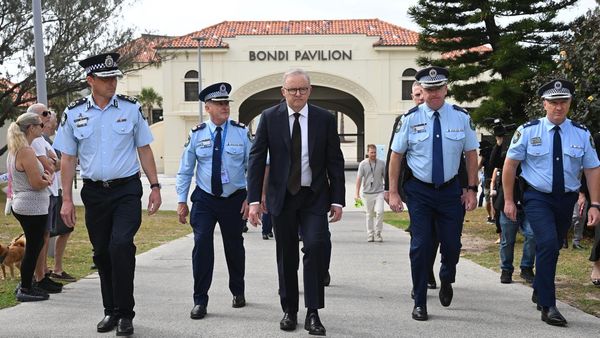
As the candidates vying to replace Nicola Sturgeon as Scotland’s first minister prepare for their first televised debate, they all agree on one thing: that the Scottish National party is at a crossroads.
That is an understatement. The contest to succeed Sturgeon as SNP leader has become an existential battle over the party’s direction, its policies and its ethos. The two leading candidates, Humza Yousaf and Kate Forbes, are setting out competing visions – Yousaf is the continuity candidate and Forbes, 32, the youthful counter-revolutionary.
And the contest could end with the socially conservative Forbes, a committed member of the Calvinist Free Church of Scotland, as Scotland’s next first minister.
The gulf will become clearer when Yousaf, Forbes and the third contender, Ash Regan, face STV’s cameras at 9pm on Tuesday in Glasgow, in the first of four televised debates.
On paper, Yousaf, 37, is favourite. Seen as Sturgeon’s choice, someone she put into the toughest posts in government to harden him up, Yousaf has endorsements from nearly half of Sturgeon’s ministers, a third of SNP MSPs and nearly all the 10 SNP MPs who have stated a preference.
By contrast, Forbes has public support from just four MSPs. Her campaign haemorrhaged support within hours of its launch after she confirmed that, as an evangelical Christian, she did not agree with same-sex marriage or having children outside marriage, was opposed to self-identification for transgender people and had backed anti-abortion campaigns.
Veteran figures such as Richard Lochhead, the employment minister, Drew Hendry, the MP and former leader of Highland council, and Pete Wishart, the SNP’s longest-serving MP, hastily rescinded their endorsements. Some commentators have applauded Forbes’ candour, and for pushing against liberal orthodoxy, while noting her experience as Scotland’s fiscally cautious finance secretary.
Yet this contest is, in truth, offering a much more accurate reflection of the SNP’s diverse membership, which swelled to more than 130,000 when Sturgeon took control after the 2014 independence referendum and has since ebbed to 104,000 or so (a figure that still, by population, makes the SNP the UK’s largest mass membership party).
It is the first open contest since Alex Salmond resumed the leadership in 2004, when he imposed a discipline and control of the party which, in large part, helped the SNP win every Scottish election from 2007 onwards and which, by design, led to Sturgeon succeeding him without a contest in November 2014.
Both built a broad coalition, taking in the leftwing pro-European urbanite, the anti-Tory trade union activist and the conservative Perthshire farmer around the promise of independence and SNP dominance at Holyrood. That coalition is now fracturing, and so too could the yes movement. If Forbes wins, it is widely expected that the pro-independence Scottish Greens will walk out of a power-sharing deal struck by Sturgeon that led to the Greens’ co-leaders become government ministers.
Two senior figures with direct experience of SNP deputy leadership contests believe this contest hinges on those often inactive members not captured in Yousaf’s high-visibility endorsements.
“If the vote was amongst either parliamentarians or activists or at SNP conference, I think Humza would walk it. I suspect it’s going to be closer to call than that,” said one source. The three candidates, said another, are largely ignorant about the true makeup of the current membership.
“There’s no reliable survey of where or who they are, and after that burst of engagement after 2014 most members are now pretty inactive,” one said. Their colleague agreed. “There may be 50,000 people voting in this and the vast majority have probably never been to SNP meetings. Where they’re going to go, I don’t know.”
So Forbes may command many more votes than observers can see, particularly in her Highlands base and the north-east, where SNP activists dislike Sturgeon’s shift against North Sea oil drilling and her deal with the Greens. Nearly half of SNP MSPs and two-thirds of its MPs have not yet declared who they support, and the first and only survey of SNP members since the contest began suggests the race is wide open.
A Daily Telegraph survey by Savanta of 515 SNP members – half the number normally used in opinion polling and also one not subject to the demographic weighting normally used – found Yousaf on 31% and Forbes on 25%, with Regan trailing on 11%. All three candidates were beaten by undecideds at 32%.
In order to win, Yousaf and Forbes must broaden their base of support: Yousaf needs to neuter Forbes’ claim that his offering is stale; Forbes needs to quickly show she can temper her religious conservatism with socially inclusive pragmatism.
This existential question is equally about independence, and the future of the UK. For some it is a question unresolved from 2014: should the yes movement be the broadest church possible in pursuit of one single aim, or is independence not worth the candle if women’s and minority rights are not central?
Perhaps Sturgeon was simply a very successful adhesive who held together competing positions rather than the standard-bearer for a new Scotland.
* Scotland’s Next First Minister: the STV Debate will air on Channel 3 in Scotland and STV Player from 9pm, Tuesday 7 March.







